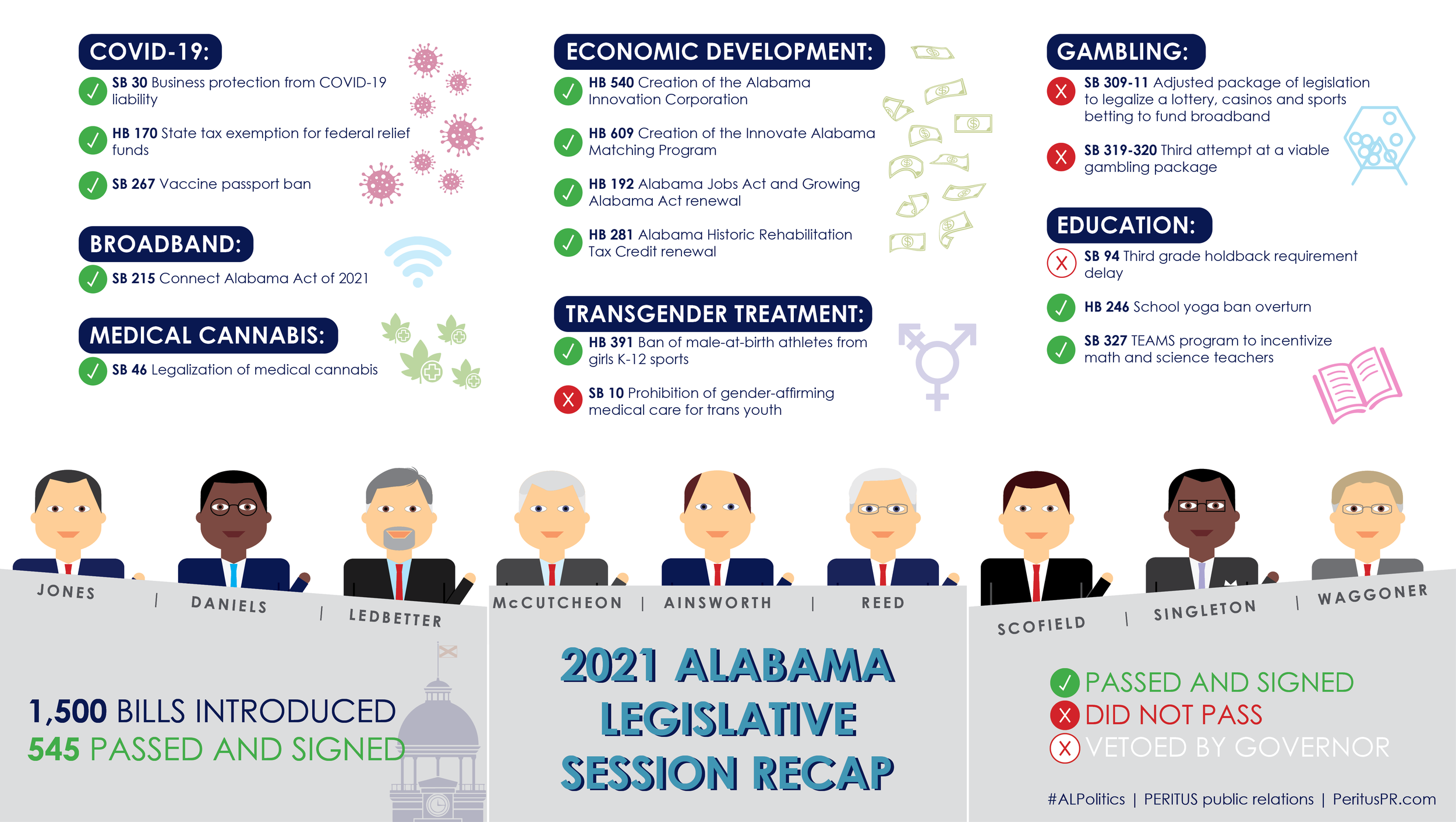2021 Alabama Legislative Session Recap
It’s the end of the season, folks.
The Alabama legislature adjourned sine die Monday, May 17, marking the end of this year’s regular session. For policy buffs, this may feel like that heart-sinking moment when the “continue watching” button on your favorite show doesn’t pop up and you have to wait for the next season.
We already know to expect a special session this year, but in the meantime, let's press pause and reflect on what passed, what didn't and what it all means for our state. Whether you binged this year's session or tuned out entirely, Peritus is here to make sure you've got the “TLDR” on the 2021 Alabama legislative session.
WHAT PASSED, WHAT DIDN’T, AND WHAT IT ALL MEANS
During the 2021 regular legislative session, lawmakers introduced 1500 bills. 545 were passed and signed into law by Governor Ivey. Here are the season highlights:
Budgets
Despite global pandemic challenges, the legislature got those checkbooks out and passed Alabama’s largest ever General Fund and Education Trust Fund budgets at $2.5 billion and $7.7 billion. The line item that’s made the most headlines? A 2% raise for state employees, including teachers.
COVID-19
COVID relief made bookend guest star appearances. The first week of session, Gov. Ivey signed bills to protect businesses from COVID-19 liability claims and exempted federal relief funds from state income tax. On the last day of the session, lawmakers passed a ban on vaccine passports, restricting municipalities from mandating vaccines. Gov. Ivey has since signed the ban.
Economic Development
It’s no surprise that COVID-19 made economic development a major legislative priority too. HB192, which renewed the Alabama Jobs Act and Growing Alabama Act, made its way through the State House and across Gov. Ivey’s desk faster than we finished watching Mrs. America.
In the spirit of making old things new, the legislature and Gov. Ivey also prioritized renewing the Alabama Historic Rehabilitation Tax Credit, which we have to thank for the revitalization of many of Alabama’s historic neighborhoods. Who doesn’t appreciate a timeless classic?
Alabama’s innovation sector seems to continue gaining national buzz as Governor Ivey signed two bills that will carry out policy recommendations made by the Alabama Innovation Commission in their interim report. HB540 will create a public-private partnership called the Alabama Innovation Corporation focused on efforts to grow and develop the state’s entrepreneurial ecosystem. HB609 will create the Innovate Alabama Matching Program, a grant-matching program to help Alabama small businesses in the tech and innovation sector access federal funds.
These pieces of legislation are critical to recruiting and retaining business and accelerating economic development.
Gambling
While some bills came close to hitting the jackpot, lawmakers did not come to a consensus on what legalized gambling should look like in the state. Should a gambling package include casinos? Where should the revenue go? In 2020, Gov. Ivey’s Study Group on Gambling Policy found 71% of Alabamians polled in favor of legalizing gambling, but the cards weren’t in their favor this year.
The leading bill died in the House on the last day of the session. Close, but no cigar. Fingers crossed this crowd favorite is renewed for another season.
More on gambling in What’s Next…
Medical Cannabis
Netflix and Chill just took on a whole new meaning in Alabama. In its third year of lighting up legislative debate, the Compassion Act passed both chambers. Now signed by Gov. Ivey, the law will create the Alabama Medical Cannabis Commission to oversee the product from seed to sale, creating a licensing process for qualifying patients. Patients must have a prescription from a specially licensed physician to get an Alabama Medical Cannabis Card. The product will not be administered in any smokable form *pause for effect,* nor will Alabama honor other states’ cards.
Broadband
One day we’ll make movies about the ways COVID-19 shaped our world. The dramatic shift to operating schools and businesses online not only revealed how critically important access is but also that progress is still needed. Signed by Gov. Ivey, the Connect Alabama Act of 2021 will create the Alabama Digital Expansion Authority to oversee strategy and infrastructure for broadband expansion in unserved and underserved areas of the state.
Gov. Ivey awarded 36 grants under which the Alabama Department of Economic and Community Affairs will administer $17 million from the Alabama Broadband Accessibility Fund to providers that have committed to expanding high-speed internet access in the state’s rural, underserved areas. This blockbuster news has us eyeing stock in streaming services.
Transgender Treatment
Alabama is one of 37 states that has introduced anti-transgender legislation in what has been deemed a “record-breaking year” for transgender-related legislation. The legislature raised two bills on the issue of transgender rights this session. Gov. Ivey has signed HB391, which restricts male-at-birth athletes from participating in girls K-12 sports. Another proposed bill stalled in the House would have made it a felony to provide gender affirmative medical care to trans minors.
A coalition of 117 (and counting) major companies including Google, Apple, Microsoft and Amazon have signed onto the statement condemning anti-trans legislation appearing across the U.S. Their letter includes a warning that should perk up the ears of economic developers and business recruiters in the state: “As we make complex decisions about where to invest and grow, these issues can influence our decisions.”
Alcohol Delivery
Alabamians are toasting to news that soon, beer, wine and liquor will be delivered to our doorsteps. SB126 will create an alcohol delivery licensing process overseen by the ABC board. Effective Oct. 1, Alabama residents (21+ of course) will enjoy delivered brewskis from licensed in-state retailers such as grocery stores, private liquor stores and breweries.
But wait, there’s more. Gov. Ivey signed another bill which will make wine delivery from ABC-licensed, out-of-state producers legal. Wine of the month club to cap off our Friday pizza and movie night? Sign us up!
Still feeling a little unclear on the ins and outs of your options here? Mac Gipson, administrator of the ABC Board, broke it down for us. Things are looking up for Alabamians wanting to look no further than their doorstep for a cold snack. Cheers!
Education
On the last day of the session, lawmakers weighed a bill that would delay the holdback requirement for third graders who miss the mark on reading efficacy. The bill passed, giving parents and teachers everywhere a sigh of relief. COVID-19 disrupted the last two school years (in a big way), and lawmakers on both sides of the aisle said “let’s give these kids a break.” In a rare exercise of her veto power, Gov. Ivey blocked the bill stating it was “hasty and premature.” Instead, she asked the Alabama Committee on Grade Level Reading to discern whether a delay is necessary after analyzing Spring 2021 Assessment results.
Gov. Ivey signed HB246 to overturn the ban on yoga in public schools. The ban was in effect since 1993, citing its connection to Eastern religion. With the ban overturned, local boards of education will determine whether they want to allow areligious yoga as an elective. (Lululemon: if you’re reading this, call us.)
Also on the education front, Gov. Ivey signed the Teacher Excellence and Accountability for Mathematics and Science (TEAMS) Act to strengthen Alabama’s math and science education. Under this legislation, eligible math and science teachers will be incentivized with a salary boost up to $20K to acquire Advanced Credentials, increasing access to quality STEM education for Alabama students. As the state continues to flip the script in the tech and innovation sector, investing in the next generation of scientists, engineers, entrepreneurs and inventors is a smart move.
Law Enforcement
At a time when law enforcement scrutiny is high, regulation was a hot topic at this year’s session. Gov. Ivey has signed a piece of legislation that will create a statewide database to keep centralized records about law enforcement officers including employment history, disciplinary actions, excessive force complaints and reassignments. Sponsored by former police officer Rep. A.J. McCampbell, the database is intended to help law enforcement agencies evaluate applicants and prevent bad apples from jumping city to city.
Lawmakers failed legislation to instate new penalties for rioters and penalize municipalities that defund law enforcement. After a year of national protests against law enforcement, the sponsor of the bill and retired assistant chief of Birmingham P.D. Rep. Allen Treadaway named a downtown protest turned riot as the reason for introducing the legislation.
More on criminal justice reform in What’s Next…
Voting
In the nick of time before sine die, lawmakers passed legislation to ban curbside voting that has now been signed by Gov. Ivey. Support of the bill was partisan, with Republicans arguing that curbside voting is too insecure. Last year, the U.S. Supreme Court ruled in favor of Alabama election officials. The plaintiffs in the case cited the importance of curbside voting for people with disabilities and/or risk factors related to COVID-19.
You may want to put subtitles on for the rest of this voting recap. Several other bills regulating voting have become law including HB538 to extend lead time requirements for absentee ballot postmarks, HB312 to make double voting a felony and HB154 to reform campaign finance by requiring municipal candidates to file reports with the secretary of state. HB338, a bill to extend the lead time on legislation affecting general elections, failed.
WHAT’S NEXT – A SPECIAL SESSION?
Rumors are swirling of a special session or two, so here are the top issues believed to make a season appearance:
Prison Reform
Two-years ago, the U.S. Department of Justice issued two official reports on the extreme violence and unconstitutionality of Alabama’s prisons, citing that the facilities’ conditions violate the Eighth Amendment which protects against cruel and unusual punishment. Inaction from ADOC led to a lawsuit, filed by the DOJ in December of last year. Wednesday, May 19, the DOJ issued an amended complaint that ADOC continues to fail at protecting inmates from violence. We aren’t spoiling the plot when we say that this situation is dire.
Gov. Ivey’s proposed resolution is to build three mega-prisons, but this plan is in jeopardy after its financial backers withdrew. The plan has proved unfavorable to state officials including State Auditor Jim Ziegler who filed a class action lawsuit against the plan. The suit was dismissed because the defendants in the case have “sovereign immunity” and leases do not count as state debt. During this year’s session, lawmakers passed legislation to create the Joint Oversight Committee on Obligation Transparency which would, with some exclusions, review high-cost (think >$10 million) state agency initiatives. Sponsors and proponents cited Gov. Ivey’s prison plan, which is estimated to cost the state more than $3 billion (with a B), as the impetus for the committee.
Without financing out the door, Plan B is for Gov. Ivey to work with legislators on a bond issue. It didn’t happen before sine die, so we may see a special session. Some legislators are eager for another shot at taking the state-owned prisons route, and this might be their ticket. We can all agree that this is a complicated, stressful crisis we have to prioritize.
COVID-19
The CDC’s latest mask guidelines have us bursting with anticipation for the “end” of the pandemic, but we’re not on the other side of it yet. Continued vaccine administration has Alabama and the rest of the country on the up and up, but we’re not in the clear – especially on the economic end of things. Individuals and businesses are still feeling the financial ramifications of the pandemic, but Biden’s American Rescue Plan to get us back on track is “unfair to Alabama” according to Gov. Ivey. She signed onto a statement with 21 other governors whose states could lose funding if relief is based on unemployment instead of population. Alabama’s laid-back approach to the lockdown means we have proportionately lower unemployment post-pandemic than other states that shut down more aggressively.
Alabama is expected to receive $4 billion of the $1.9 trillion package. How will officials determine where to spend it? You guessed it: special session.
Gambling
So, a lottery didn’t happen this legislative session, but we know it’s something many Alabamians want. Debates have lasted decades over what gambling should look like in the state, and this year was no exception. Lawmakers including Speaker Mac McCutcheon are eager to put gambling on the ballot for Alabama voters in 2022 – but how can they make it happen? Gov. Ivey could call a special session on the issue, which is plausible with the findings of her Study Group, or lawmakers could revisit it during the 2022 regular session. We’ll be saving this in our queue and keeping an eye on this one.
Redistricting
The Census results are in, and Alabama gets to keep our seven U.S. Congressional seats. Now what? A joint committee of the Alabama legislature will redraw maps for seven Congressional districts, eight state school board districts, 35 state senate districts and 105 state house districts. The committee will not have complete district-level data until August, so we can expect to see a special session on redistricting before the end of the year.
Our PUBLISHED by Peritus takeaway is this:
Legislative sessions are like Law & Order seasons – they just keep coming. After the 2020 session ended abruptly due to COVID-19, there was no shortage of priorities on the 2021 agenda: prisons, gambling, COVID-19 relief and economic development to name just a few. It was an ambitious and productive chapter for the state of Alabama, and we hope that with Peritus as your guide, you were able to track every plot point.
Lawmakers left a few cliffhangers (prisons, COVID-19 relief, gambling and redistricting) signaling our anticipation for a special session.
We hope you’ll keep up with us on Instagram where during each session (regular or special) our team breaks down legislative movements every week with our “Friday Five” policy updates.
Thanks for tuning in. Until next time.












